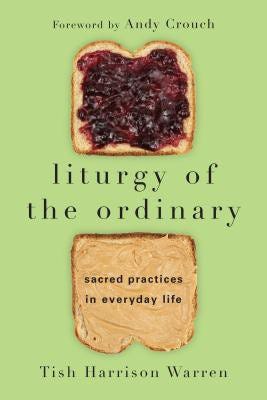NEW BLOG POST from Abby King

How To See Normal Life in a Different Light
Review: Liturgy of the Ordinary, by Tish Harrison Warren

A friend was telling me about weeding her garden this week. As she got on with the job, she prayed: I’m so frustrated at being here again! I only just got rid of these weeds last week! She told me that she felt God’s reply: I love weeding He said, I love working in your life, even knowing that we’re going to be coming back to the same thing over and over again. I love repeating the work that’s going to help you flourish.
In her book, Liturgy of the Ordinary, Tish Harrison Warren argues that the mundane, sometimes irritating tasks that we have to carry out regularly aren’t a bolt on, or an added extra to our real lives, they are our real lives. Each chapter examines practices and habits such as making the bed, answering emails, brushing your teeth or drinking tea, through the lens of liturgy, reflecting on how they might provide space for us to remember God and live in His story.
One of my favourite things about the book is how readable and practical it is, while still being underpinned by deep theological thinking. So eating leftovers, for example, becomes a moment to reflect on the Eucharist and where our true nourishment comes from. It can be seen as an invitation to receive with gratitude whatever is set before us, ‘whether it looks like extravagant abundance, painful suffering or simply a boring bowl of leftovers’ (p. 65). The presence of extra food also reminds us that in our own lives, food is freely available and abundant, but that this is not the case for everyone. The production and consumption of food is often bound up in systemic injustice and we must seek to eat and live in ways that better serve our neighbours and steward our land (pp 70–71).
Another chapter unpacks ideas around patience. Warren’s description of her frustration at being stuck in a traffic jam that will impact the rest of her day is very relatable. We don’t have to scratch very far below the surface to discover that we are impatient because we want to be in control of time, as though it belonged to us in the first place. Waiting is described as an act of faith — the acknowledgment that we are going somewhere, even though we have not yet arrived. Warren asks us to imagine what it would be like if, in the middle of our traffic jam, we decided to set up camp there, because we forgot our commitment to where we are going. She uses this analogy to remind us that all our waiting, as Christians, is future oriented, reminding us that ‘we are a people on the way. It allows us to live in the present as an alternative people, patiently waiting for what is to come… We seek justice, practice mercy, and herald the kingdom to come’ (p. 113).
At the heart of Liturgy of the Ordinary is the idea that, from waking to sleeping and everything in between, our daily habits and practices open up liminal spaces where we can meet with God. Their repetitive nature reminds us that ‘the work of repentance and faith is [also] daily and repetitive. Again and again, we repent and believe’ (p. 35). Again and again, we gather as the church to remember our collective story, and Warren’s book reminds us that this story doesn’t end on a Sunday after the service. Like my friend weeding her garden, we can find that God is here, in the middle of the mundane and the ordinary, willing to meet with us right where we are. And the daily tasks that we can find so dull and boring can be the very things that shape us towards knowing Him better.
If you enjoyed this, you might also like:
This fun podcast where Ros Clarke and Amanda Robbie discuss Liturgy of the Ordinary




